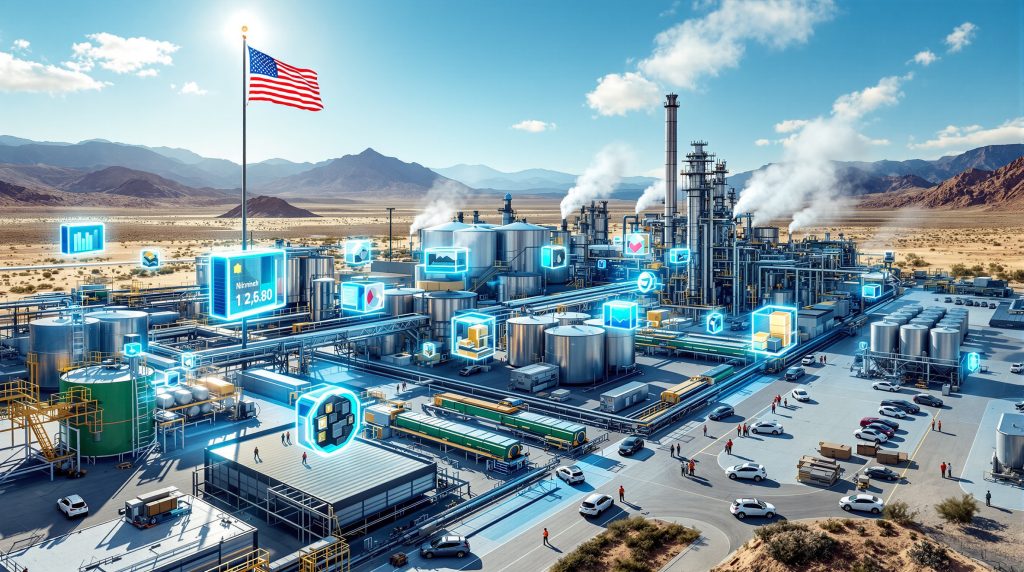What Makes This Nickel Supply Chain Partnership Strategically Important?
The Foundation of Domestic Battery Material Security
The Aqua Metals partnership for US nickel supply chain with Westwin Elements represents a watershed moment for American critical mineral independence. This $12 million annual agreement framework establishes the foundation for supplying up to 1,000 metric tons of recycled nickel carbonate yearly, beginning with commercial deliveries targeted for 2027. The strategic timing aligns with accelerating domestic battery manufacturing capacity and growing concerns over foreign supply chain vulnerabilities.
The partnership addresses a fundamental weakness in America's battery supply chain infrastructure. Currently, the United States imports approximately 65-75% of its refined nickel requirements, with primary sourcing from geopolitically sensitive regions including Russia, Indonesia, and the Philippines. This dependency creates significant economic and national security risks, particularly as electric vehicle adoption accelerates and grid-scale energy storage demands surge.
Critical Mineral Supply Chain Vulnerabilities
The current U.S. nickel supply landscape reveals alarming dependencies on unstable international sources. Indonesia controls approximately 33% of global refined nickel production, while Russia maintains 13% of global output despite ongoing sanctions and trade restrictions. The Philippines contributes another 8% of worldwide production, creating a concentration risk where over half of global nickel originates from three countries with varying degrees of political and environmental regulatory uncertainty.
Economic disruptions from foreign supply chain interruptions have historically caused significant price volatility in battery materials. London Metal Exchange nickel prices have experienced annual volatility ranges of 20-30% over the past decade, directly impacting battery manufacturing costs and ultimately affecting electric vehicle pricing. Furthermore, this critical minerals strategy aims to provide price stability through long-term domestic supply agreements, reducing exposure to international commodity market fluctuations.
How Does AquaRefining Technology Enable Closed-Loop Nickel Recovery?
Revolutionary Battery Recycling Methodology
The AquaRefining technology transforms lithium-ion battery waste into high-purity nickel carbonate through a sophisticated closed-loop recovery system. The process begins with collecting end-of-life electric vehicle batteries and manufacturing scrap, which undergo physical separation to isolate cathode materials. These materials are then processed into black mass, an intermediate material containing 20-35% nickel content by weight.
However, Aqua Metals' proprietary extraction methodology processes this black mass through controlled chemical reactions to produce battery-grade nickel carbonate. The recycled material must achieve minimum 99.0% purity levels to meet stringent quality standards required for battery cathode precursor applications. This purity standard equals or exceeds virgin-mined nickel specifications whilst eliminating the environmental impact associated with traditional mining operations.
The technical advantage of recycled nickel carbonate lies in its controlled composition and consistent quality characteristics. Unlike mined nickel ore, which varies in grade and impurity content depending on geological location, recycled battery materials provide predictable feedstock composition. For instance, this battery recycling breakthrough enables more precise refining processes and reduces quality control variations in final battery manufacturing.
Nevada Pilot Plant Performance Metrics
Aqua Metals has successfully validated its recycling technology through comprehensive testing at its Nevada pilot plant facility. The company confirmed that battery-grade nickel carbonate produced from recycled lithium-ion battery material meets all technical specifications required for commercial battery manufacturing applications. This validation represents a critical milestone in scaling from laboratory demonstration to commercial production capacity.
The pilot plant operations demonstrate the feasibility of processing diverse battery chemistry inputs whilst maintaining consistent output quality. Modern electric vehicle batteries contain varying nickel concentrations depending on cathode chemistry, ranging from 5-8% nickel content in standard formulations to higher concentrations in advanced high-energy density designs. The AquaRefining process accommodates this variability whilst producing standardised nickel carbonate output.
Environmental impact assessments of the Nevada facility indicate significant advantages compared to conventional nickel mining and refining operations. Battery recycling typically generates 40-60% lower carbon emissions than primary laterite ore processing, which requires 6-12 metric tons of CO₂ emissions per metric ton of refined nickel produced. The domestic recycling approach also eliminates international shipping emissions and reduces water consumption associated with traditional mining operations.
What Role Does Westwin Elements Play in America's Nickel Infrastructure?
The Only Major U.S. Nickel Refinery Advantage
Westwin Elements holds a unique strategic position as the only major nickel refinery operating in the United States, representing critical infrastructure for domestic battery material production. The U.S. currently maintains minimal domestic nickel refining capacity of approximately 20,000-30,000 metric tons annually, less than 3% of global refining capacity. This limited infrastructure creates bottlenecks in domestic critical mineral processing and increases dependency on foreign refined materials.
The partnership leverages Westwin's existing refining capabilities to process recycled nickel carbonate from Aqua Metals into final battery-grade specifications. This integration creates a fully domestic supply chain from battery waste collection through final material delivery to battery manufacturers. In addition, the arrangement eliminates multiple import dependencies whilst utilising existing American industrial capacity more effectively.
Westwin's technical capabilities in material refinement enable the partnership to serve diverse battery manufacturer requirements. Different battery chemistries require specific nickel carbonate specifications, including precise control of trace elements, particle size distribution, and moisture content. The company's refining processes can adjust these parameters to meet individual customer requirements whilst maintaining consistent quality standards.
Commercial Facility Development Timeline
The partnership development requires significant infrastructure investments from both companies to achieve the targeted 500-1,000 metric ton annual production capacity by 2027. Aqua Metals must scale its recycling operations from pilot plant demonstration to commercial production levels, representing approximately 10-50 times current capacity depending on pilot facility throughput.
Commercial facility construction involves complex regulatory approval processes for both recycling and refining operations. Battery recycling facilities require environmental permits for handling lithium-ion battery waste, chemical processing approvals, and workplace safety certifications. The integrated approach requires coordination between multiple regulatory jurisdictions whilst maintaining compliance with evolving battery material quality standards.
Geographic advantages of domestic refining operations include proximity to emerging battery manufacturing clusters in the southeastern United States. Major battery production facilities from companies like Ultium Cells, Ford-SK Innovation partnerships, and other manufacturers are establishing operations within 500-1,000 miles of potential domestic nickel supply sources. This proximity reduces transportation costs and delivery timelines compared to imported materials requiring international shipping and customs processing.
Why Is Recycled Nickel Carbonate Superior to Imported Alternatives?
Environmental Benefits of Closed-Loop Systems
The environmental advantages of recycled nickel carbonate compared to imported alternatives extend beyond carbon footprint reduction to encompass comprehensive sustainability metrics. Traditional nickel mining in Indonesia and the Philippines involves laterite ore processing, which generates 6-12 metric tons of CO₂ emissions per metric ton of refined nickel. Battery recycling operations typically produce 1-3 metric tons of CO₂ per metric ton of recovered nickel, representing a 50-75% reduction in carbon emissions.
Domestic recycling eliminates international shipping emissions associated with importing refined nickel from Southeast Asia. Standard shipping routes from Indonesia and the Philippines to U.S. ports require 8,000-12,000 nautical miles of ocean transport, consuming approximately 2-4 weeks transit time and generating substantial maritime emissions. The closed-loop domestic system eliminates these transportation-related environmental impacts whilst reducing supply chain complexity.
Water consumption represents another critical environmental advantage for recycled materials. Laterite ore nickel mining requires intensive water usage for ore processing, often stressing local water resources in tropical regions. Consequently, battery recycling operations use significantly less water per unit of refined nickel produced whilst enabling water recycling and treatment within controlled industrial environments.
Economic Advantages for Battery Manufacturers
Cost stability represents a fundamental economic advantage of domestic recycled nickel carbonate compared to imported alternatives. London Metal Exchange nickel prices historically fluctuate within ±20-30% annual ranges, creating budget uncertainty for battery manufacturers planning long-term production schedules. Long-term supply contracts like the $12 million annual framework provide predictable pricing structures that enable more accurate financial planning and cost management.
Supply chain resilience during global market volatility offers significant risk mitigation benefits for domestic battery production. Recent geopolitical tensions have demonstrated the vulnerability of international critical mineral supply chains to trade restrictions, sanctions, and shipping disruptions. The 2022-2023 period saw multiple instances of nickel market disruptions affecting global battery production schedules and pricing structures.
Quality consistency from controlled recycling processes provides manufacturing advantages compared to variable-grade imported materials. Mined nickel ore quality varies significantly based on geological characteristics, requiring flexible refining processes to accommodate different impurity profiles. However, recycled battery materials offer more predictable feedstock composition, enabling optimised refining parameters and consistent final product specifications.
| Comparison Factor | Recycled Domestic Nickel | Imported Virgin Nickel |
|---|---|---|
| Carbon Footprint | 50-75% lower | Baseline mining emissions |
| Supply Security | High domestic control | Variable geopolitical risk |
| Price Volatility | Contract-based stability | LME spot market exposure |
| Quality Consistency | Controlled recycling parameters | Variable ore grade characteristics |
| Delivery Timeline | Domestic logistics | 2-4 week international shipping |
How Will This Partnership Impact the Broader Battery Supply Chain?
Integration with Electric Vehicle Manufacturing
The Aqua Metals partnership for US nickel supply chain with Westwin Elements establishes critical infrastructure connections supporting America's expanding electric vehicle manufacturing sector. Current U.S. EV sales reached approximately 1.6 million vehicles in 2024, with Department of Energy projections indicating 5-8 million annual sales by 2030. Each electric vehicle battery pack contains 8-15 kilograms of refined nickel, depending on cathode chemistry and energy density requirements.
The partnership's planned 500-1,000 metric ton annual capacity can support approximately 35,000-125,000 electric vehicle battery packs yearly, representing meaningful domestic supply chain integration. This capacity aligns with emerging U.S. battery manufacturing facilities establishing operations through 2027-2030. Furthermore, the timing enables coordination with major automotive manufacturers planning domestic battery supply diversification strategies.
Downstream connections to battery cell production facilities require precise coordination of material specifications and delivery schedules. Battery manufacturers typically maintain 30-90 day raw material inventory levels to ensure consistent production schedules. In addition, the domestic recycled nickel supply chain reduces inventory requirements by eliminating international shipping delays and customs processing timeframes that can extend to several weeks for imported materials.
Critical Mineral Security Implications
The partnership directly contributes to national defence supply chain resilience by reducing dependency on foreign critical mineral sources. Current U.S. battery manufacturing nickel demand approximates 15,000-20,000 metric tons annually, projected to increase to 40,000-60,000 metric tons by 2030 based on electric vehicle adoption forecasts. The 1,000 metric ton annual capacity represents 1.7-2.5% of projected 2030 demand, establishing a foundation for expanded domestic recycling capacity.
Federal critical minerals energy strategies emphasise developing domestic supply chains for materials essential to clean energy infrastructure and national security applications. The Defense Production Act and Infrastructure Investment and Jobs Act provide policy frameworks supporting domestic critical mineral development. Consequently, the partnership aligns with these federal initiatives by demonstrating commercial viability of domestic recycled critical mineral production.
Potential expansion to additional battery materials recovery could leverage similar recycling infrastructure for lithium, cobalt, and manganese extraction. Lithium-ion batteries contain multiple critical minerals that currently require extensive import dependency. Developing integrated domestic recycling capabilities for multiple battery materials could significantly enhance supply chain resilience whilst creating economies of scale for recycling operations.
What Are the Technical Challenges and Solutions for Scaling Operations?
Commercial Facility Development Requirements
The transition from pilot plant operations to commercial-scale production presents significant technical and logistical challenges requiring careful coordination between Aqua Metals and Westwin Elements. Commercial facility development for 1,000 metric ton annual capacity requires infrastructure investments estimated in the tens of millions of dollars, including specialised equipment for battery material processing, environmental control systems, and quality assurance laboratories.
Battery recycling facility design must accommodate diverse input materials from different battery chemistries and manufacturers. Electric vehicle batteries from various automakers contain different cathode formulations, requiring flexible processing capabilities to handle nickel-manganese-cobalt (NMC), nickel-cobalt-aluminium (NCA), and emerging high-nickel cathode chemistries. The commercial facility must maintain consistent output quality despite variable input composition.
Quality control systems for battery-grade material standards require comprehensive analytical capabilities including inductively coupled plasma mass spectrometry (ICP-MS) for trace element analysis, X-ray fluorescence (XRF) for elemental composition verification, and particle size analysis for physical specifications. However, these analytical requirements necessitate significant laboratory infrastructure investments and certified personnel training programmes.
Financing and Regulatory Pathway
Capital requirements for commercial-scale operations encompass facility construction, equipment procurement, working capital, and regulatory compliance costs. Battery recycling facilities require specialised equipment including battery disassembly systems, hydrometallurgical processing equipment, and material handling systems designed for hazardous waste processing. Total capital investments typically range from $50-100 million for facilities targeting 1,000+ metric ton annual capacity.
Environmental permitting for recycling facility expansion involves multiple regulatory jurisdictions including federal EPA approvals for hazardous waste handling, state environmental permits for air emissions and water discharge, and local zoning approvals for industrial operations. The permitting process typically requires 12-24 months for complex recycling operations, necessitating early initiation to meet 2027 commercial production targets.
Furthermore, industry certification processes for battery material suppliers include ISO 9001 quality management systems, ISO 14001 environmental management standards, and specific automotive industry certifications such as IATF 16949 for suppliers to automotive manufacturers. These certifications require documentation of quality control procedures, environmental compliance systems, and continuous improvement processes that must be established before commercial operations commence.
What Does This Mean for Investors and Industry Stakeholders?
Market Opportunity Assessment
The $12 million annual supply agreement framework represents significant revenue potential for both Aqua Metals and Westwin Elements, with expansion possibilities as domestic battery manufacturing capacity increases. Based on current London Metal Exchange pricing and battery-grade nickel carbonate premiums, the 1,000 metric ton annual supply capacity could generate revenues of $12-15 million annually at current market conditions.
Growth prospects in domestic battery material markets extend beyond the initial partnership scope as electric vehicle adoption accelerates and grid-scale energy storage deployment expands. Industry forecasts project U.S. battery manufacturing nickel demand increasing from current levels of 15,000-20,000 metric tons annually to 40,000-60,000 metric tons by 2030. This demand growth creates expansion opportunities for additional recycling capacity and supply agreement volumes.
Competitive positioning against international suppliers requires consideration of cost structures, quality consistency, and supply reliability factors. Domestic recycled nickel carbonate may command premium pricing compared to imported materials due to supply chain advantages, environmental benefits, and reduced geopolitical risks. In addition, battery manufacturers increasingly value supply chain resilience and sustainability credentials in purchasing decisions.
Risk Factors and Mitigation Strategies
Technology scaling challenges from pilot to commercial production represent primary execution risks for the partnership. Scaling recycling processes requires maintaining material quality standards whilst increasing throughput capacity, often revealing technical challenges not apparent at pilot scale. The companies must demonstrate consistent production capabilities and quality control before securing final binding supply agreements.
Market price volatility for nickel carbonate materials could affect partnership economics if London Metal Exchange pricing declines significantly below current levels. The $12 million annual valuation assumes current nickel pricing of approximately $12,000-15,000 per metric ton. Substantial price decreases could reduce partnership revenues and affect commercial facility development financing.
Regulatory compliance requirements for critical mineral operations continue evolving as federal and state agencies develop frameworks for domestic battery material production. Changes in environmental regulations, waste handling requirements, or quality standards could necessitate facility modifications or additional compliance investments affecting project economics.
Key Insight: This partnership represents the first major step toward establishing a fully integrated domestic nickel recycling ecosystem, potentially reducing U.S. reliance on foreign critical mineral imports by creating a sustainable closed-loop system from battery waste to refined materials ready for new battery production.
How Does This Partnership Align with National Energy Security Goals?
Federal Critical Mineral Initiative Support
The Aqua Metals partnership for US nickel supply chain with Westwin Elements directly supports federal critical mineral security objectives outlined in the Infrastructure Investment and Jobs Act and Department of Energy battery material strategies. The partnership demonstrates commercial viability for domestic critical mineral recycling, providing a model for expanded domestic supply chain development across multiple battery materials.
Department of Energy initiatives including the Battery Materials Processing and Battery Manufacturing grants programme prioritise domestic supply chain development for critical battery materials. Moreover, this recent US mineral order aligns with these federal funding priorities by establishing domestic recycling capacity that reduces import dependencies whilst supporting clean energy infrastructure development goals.
National defence supply chain resilience benefits from domestic critical mineral capacity development, particularly for materials essential to defence applications including energy storage systems, electric military vehicles, and critical infrastructure backup power systems. Consequently, the partnership contributes to strategic mineral reserves through domestic production capacity that remains available during international supply disruptions.
Long-term Supply Chain Resilience
The partnership establishes foundational infrastructure for expanded domestic battery material recycling beyond nickel recovery. Lithium-ion batteries contain multiple critical minerals including lithium, cobalt, manganese, and graphite that currently require extensive import dependency. The technical capabilities developed through this partnership could support expanded recycling operations for additional battery materials.
Technology transfer opportunities extend the partnership's impact beyond immediate participants by demonstrating commercial recycling processes for other companies entering domestic battery material markets. Successful operation of the integrated recycling-refining supply chain provides technical validation and operational experience applicable to similar projects across the United States.
Foundation development for comprehensive domestic battery material ecosystems requires coordination among recycling companies, refiners, and battery manufacturers to create integrated supply chains. For instance, the critical minerals order provides a commercial framework that other companies can adapt for lithium recycling, cobalt recovery, and integrated battery material processing operations.
What Are the Next Steps and Timeline Expectations?
2025-2027 Development Milestones
The partnership progression from non-binding letter of intent to commercial operations requires completion of several critical milestones over the next two years. Finalisation of binding supply agreements depends on both companies completing commercial facility development plans, securing project financing, and obtaining necessary regulatory approvals for expanded operations.
Commercial facility construction and commissioning timelines require coordination between Aqua Metals' Nevada recycling expansion and Westwin Elements' refining capacity optimisation. Construction typically requires 12-18 months for recycling facilities of this scale, whilst refining infrastructure modifications may require shorter timeframes depending on existing facility capabilities.
Initial production and delivery schedules must align with battery manufacturer requirements and market demand timing. However, the 2027 commercial delivery target provides sufficient time for facility development whilst meeting anticipated increases in domestic battery manufacturing capacity from major automotive and energy storage projects currently in development phases.
Future Expansion Possibilities
Additional battery chemistry recycling capabilities could expand the partnership scope beyond current nickel carbonate focus to include integrated recovery of lithium, cobalt, and manganese from diverse battery waste streams. The infrastructure investments for commercial facility development provide foundations for processing multiple battery materials using similar recycling technologies.
Geographic expansion of recycling operations could establish additional facilities in regions with high concentrations of electric vehicle adoption and battery waste generation. California, Texas, and southeastern states with emerging battery manufacturing clusters represent potential locations for expanded recycling capacity using the Aqua Metals-Westwin partnership model.
Furthermore, integration opportunities with other critical mineral recovery processes could leverage recycling infrastructure for additional materials including rare earth elements, copper, and aluminium recovered from electric vehicle components beyond battery systems. This integrated approach maximises resource recovery whilst creating economies of scale for domestic critical mineral processing operations.
Additionally, external partnerships with companies like those detailed in recent industry collaborations demonstrate the growing interest in domestic nickel supply chain development. These supply agreements highlight the commercial viability of recycled battery materials in supporting America's clean energy transition.
Disclaimer: This analysis contains forward-looking statements regarding market projections, technology development timelines, and regulatory developments. Actual results may vary significantly from projections due to market conditions, technological challenges, regulatory changes, and other factors beyond company control. Investment decisions should consider comprehensive risk assessments and current market conditions.
Looking to Capitalise on America's Critical Mineral Independence?
Discovery Alert's proprietary Discovery IQ model delivers instant notifications on significant ASX mineral discoveries, identifying emerging opportunities in critical battery materials and domestic supply chain developments. Begin your 30-day free trial today to position yourself ahead of the market as companies like Aqua Metals transform America's strategic mineral landscape.




